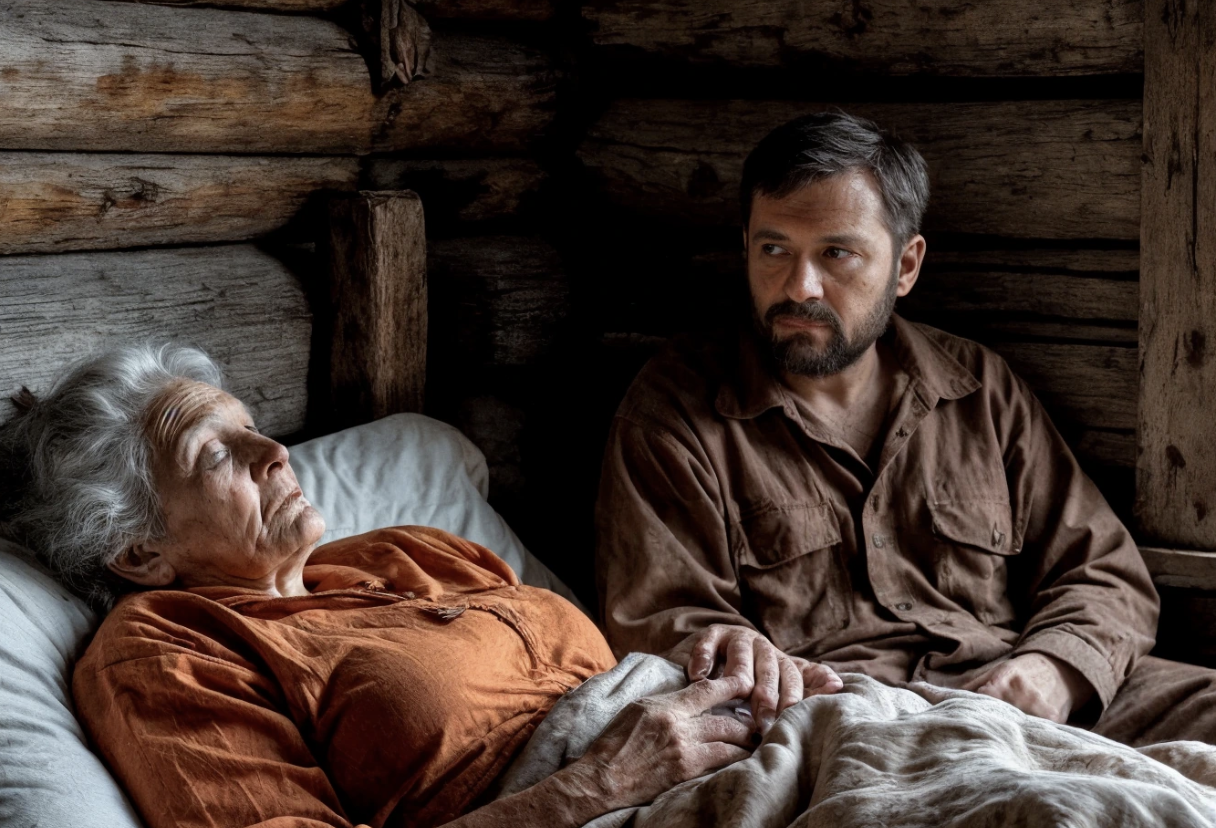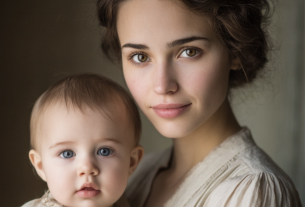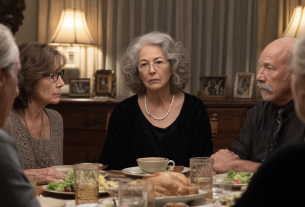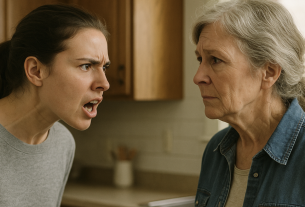Grandma Lyuba struggled to lift the bucket of icy water from the pump and, heavily shifting her feet, walked along the well-trodden path to the house. The frost tickled her face, her fingers slipped uncontrollably on the rusty handle. Right at the door, she stopped to catch her breath: she placed one bucket on the step, reached for the second… and suddenly slipped.
“Oh, Lord!..” she barely managed to whisper before collapsing to the ground.
Her shoulder painfully hit the edge of the step, and a dull aching pain echoed in the back of her head. For several seconds, she lay motionless, unable to move.
Then she tried to get up—but her legs didn’t obey. It was as if she was cut off from the waist down. Gasping from pain and fear, she began crawling toward the door, grabbing at anything within reach: an old stool, a broken broom, the edge of her own skirt. Her back ached, sweat broke out on her forehead, and everything around her swayed and blurred.
“Come on, Lyubanya… come on…” she muttered to herself, scrambling onto the old couch in the hallway.
The phone lay on the windowsill. With trembling fingers, she dialed her son’s number.
“Pashenka… son… I’m not well… come… ” she whispered and lost consciousness.
By evening, Pavel arrived. He burst into the house with a crash, letting in cold air. Without a hat, wind-tousled, he froze in the doorway, seeing his mother half-lying on the couch.
“Mom… what’s wrong?” he approached, gently taking her hand. “God, she’s ice-cold…”
Without hesitation, he called his wife.
“Olya, come quickly… Yes, she’s not well… Seems like she can’t move at all.”
Grandma Lyuba heard everything, though her face showed no emotion. Inside, a spark of hope flared: her son was scared, which meant he cared. Maybe the family would finally come together? Maybe they would save her?
She tried to move her legs—no result. Only the fingertips twitched faintly. Suddenly she cried—not from pain, but from the thought that maybe not all was lost.
Olya appeared only two days later. She stood at the doorway holding Anya’s hand, irritated and tired, as if torn away from important matters.
“Well, you’ve done it now, old woman,” she hissed through clenched teeth, casting a glance at her mother-in-law. “Now lie there like a log, since that’s how it turned out.”
Anya clung to her mother’s hand, looking at grandma with worry. Grandma tried to smile, but her face did not respond.
Olya entered the house without greeting. Pavel took her to the kitchen. There they spoke quietly but tensely. Grandma Lyuba could not catch the words but felt the conversation was bitter and ill-meaning.
After a few minutes, her son returned. Silently, he lifted her into his arms.
“Where to?..” she whispered.
He did not answer. Just pressed his lips into a thin line. She wrapped her arms around his neck, inhaling the familiar scent—a mix of machine oil and tobacco.
“To the hospital?..” she asked again.
Silence. Only the footsteps grew quicker.
But he did not go to the hospital. He carried her past the house to the annex—once used to store potatoes, old skis, iron buckets. Cold pierced through clothes, wind whistled through window cracks, and the floorboards were cracked. The smell of dampness and neglect filled the air.
Pavel laid her on a hard bench covered with a worn blanket.
“You’ll rest here,” he said without looking her in the eyes. “It’s too late to change anything now. You’re almost eighty, mom.”
He turned and left without giving her a chance to say a word.
Shock came slowly but completely. Grandma Lyuba lay motionless, staring at the ceiling, feeling the cold penetrate beneath her skin. Why was he like this? What had she done?
Images from the past flashed before her eyes: how she raised her son alone, worked as a cleaner, bought him a jacket on credit. How she paid for the wedding because her daughter-in-law’s parents turned away—“not a match, uneducated.”
“I always stood up for him…” she whispered, unable to believe what was happening.
She remembered Olya’s image—always restrained, sharp-tongued, never a warm word. Not a drop of gratitude for her help. At least once she would have come herself without waiting to be asked. But no—she had come only once, for the granddaughter’s birthday.
And now she lay here in a cold little room like unwanted junk. She did not even know if she would live until morning.
Each day, the certainty that something terrible was happening grew stronger. Pavel came less and less—putting down a bowl of soup and disappearing immediately. Olya sometimes opened the door, glanced briefly from afar, checking if she was still alive.
But one morning, Grandma Lyuba heard a stranger’s voice outside—cheerful and lively.
“Nice house. Bright, spacious. Gas connected?”
“Of course,” Olya answered. “Want me to show you the kitchen?”
Grandma Lyuba froze. Her heart pounded. Could it be? They were planning to sell the house?
Later, voices reached her ears—someone praising the sauna, asking about the foundation. She felt like an object not yet buried but already being sold. Tears streamed into her pillow—hot and silent.
“So that’s it…” flashed through her mind. “I don’t need help. I’m a burden. And the house is a profitable deal.”
She lay still. Only her lips moved slightly—whispering long-forgotten prayers. And then—a slight, almost imperceptible movement in her right hand. She froze. Tried again—yes, the fingers obeyed. Her voice returned too—hoarse but alive.
She tried to lift her head—to call for help…but froze again. No. They would hear. They’d think she was delirious. Or worse, they might finish her off.
“Be quiet, old woman… be quiet…” she whispered as if swearing an oath.
Two days passed in silence until a new quarrel erupted. Voices behind the wall were loud and irritated. Every word came through the door cracks.
“Why did you let her go barefoot?!” Pavel yelled.
“Where were you yourself? She ran after her doll, I didn’t notice!”
“She has a fever! Her whole body is shaking!”
“I’m not a doctor! Call your paramedic—Mikhail!”
The name struck like thunder from a clear sky. Grandma Lyuba shuddered. Mikhail… she had heard about him. Some said he had been imprisoned for fighting, others for something worse. But he worked—because there was no one else.
Grandma Lyuba tensed. She wanted to say, “I have honey, jam, linden brooms… I would help.” But she lay forgotten and helpless. Anya was sick, and she couldn’t even bring water to her granddaughter.
Inside, everything contracted—humiliation, fear, powerlessness. But deep down, something else flickered. Hope. Maybe Mikhail would understand. See the truth.
When the door burst open and a stranger entered the room, she immediately knew—it was him. Mikhail. His steps confident, his inspection professional. He spoke softly, examining Anya. Before leaving, he said:
“And where is the lady of the house?”
Pavel hesitated. A pause hung in the room. Grandma Lyuba froze. She wanted to scream—but couldn’t. Only her eyes opened wide, full of pain and hope.
She twitched, reached out her hand—and accidentally knocked a mug off the stool. It fell with a dull thud.
“Oh…” Pavel hurried to clean up. “Don’t pay attention. Mom is in the nursing home. We’re here temporarily. Selling the house…”
Mikhail said nothing. He nodded and left. But his gaze—calm and sharp—caught something inside Grandma Lyuba.
A little later, the door to the annex suddenly flung open. Pavel stormed in, his face twisted with rage.
“What are you doing?! Are you crazy?! Dropping mugs?!” He loomed over her, breathing anger and heaviness. “Not another sound, understand?! Not a single extra movement!”
He cursed and slammed the door, leaving her alone. Her heart pounded, her throat tightened into a lump. But somewhere deep inside, in her very heart, a flicker appeared:
“He understood. Mikhail understood…”
At night, a barely audible creak woke her. The door… someone gently pushed it open. Grandma Lyuba tensed. Her heart froze. Darkness thickened, every noise seemed threatening.
“Could it be Pavel?.. Or Olya?.. Maybe they forgot to close the window…”
Quiet footsteps. A beam of a flashlight slipped through the cracks. A man entered the room. Grandma Lyuba squinted. The face was unseen, but the voice… she recognized it.
“It’s me, Mikhail…” he whispered, sitting down beside her.
She sobbed. Wanted to rush to him, but only her fingers trembled. He sat close, gently took her hand. She gripped his fingers with all her might.
“I knew… I knew you would come…” she whispered.
“Shh, shh. I won’t be long.”
Mikhail carefully turned her onto her side, began feeling her back. She grimaced but did not recoil.
“Here, between the lower back and the sacrum. A pinched nerve. But not hopeless.”
He took out some oil and started a massage—soft at first, then deeper, pressing firmly. Grandma Lyuba clenched her teeth, sweat covered her forehead, her shirt got wet. Tears flowed—not from fear, but from pain and tension.
“A little more… breathe… like that…”
More than an hour passed. Mikhail finished, covered her with a blanket.
“That’s enough for today. It’ll be easier tomorrow. You’re strong, Grandma Lyuba. You’ll manage.”
He fixed the pillow and got ready to leave.
“Mikhail… thank you…” she whispered, almost losing consciousness.
Morning came suddenly. Grandma Lyuba awoke to noise—at first, she thought it was a dream. But then she heard shouting, stomping, the clatter of a gate.
“You have no right!” Olya screamed. “This is our house! We live here!”
“Calm down. Open the annex. There should be a woman named Lyudmila Alekseevna,” a firm male voice said.
“She’s in the nursing home! No one is there!” Pavel shouted.
Knock on the door. Grandma Lyuba froze. Looked at her feet. Felt warmth. Real warmth. She cautiously leaned on her elbows, pulled herself up… and sat. Then slowly stood.
“God… I’m standing… I’m really standing…” she whispered, holding onto the wall.
At that moment the door flew open. A young police officer stood in the doorway—in uniform, notebook in hand. Behind him was Mikhail—calm, collected, attentive.
“Here,” he said shortly.
He stepped back, and Grandma Lyuba slowly stepped into the light. Wearing only a nightgown and a shawl on her shoulders, but her legs held her. She stood. Looking straight ahead.
“That’s me,” she said.
The officer looked at her as if she had risen from the dead.
“I was told you don’t walk…” he mumbled.
“But I do. And not in a nursing home,” Grandma Lyuba said firmly.
Mikhail approached, gently took her arm.
“Let’s go,” he said simply.
She took the first step outside. Pavel and Olya stood in the yard. Seeing their mother, they froze like statues. Olya’s face paled, lips trembled. Pavel looked down—as if caught holding someone else’s good.
No words were spoken. Not a single sound broke the awkward silence. They turned and quickly disappeared into the house.
The officer continued writing something in his notebook, but the woman stopped him:
“No need. They were just visiting. This is my house. Everything is fine.”
The policeman looked at her, then glanced at Mikhail. He nodded slightly. The officer shrugged and left.
Silence descended on the yard like a veil. Only leaves rustled underfoot. Grandma Lyuba stood barefoot, free, like for the first time in many years.
When the officer left, a commotion started inside the house. No shouting, no scandals—just frantic movement: suitcases, boxes, children’s things—all flying into the car as if driven by invisible fear. Grandma Lyuba watched from the window, clutching an old lace shawl to her chest.
Pavel came closer. His voice was quiet, his face gray.
“We’re leaving… It’ll be better this way. You’ll be calmer alone, right?”
She did not blink. Stood straight like a tree.
“Go, Pasha. Don’t come back. Ever.”
He froze as if struck. Pressed his lips, bowed his head.
Olya, standing a little apart, hissed through her teeth:
“You asked us to help… And now we’re nothing to you?”
Grandma Lyuba didn’t answer. Not a single word. Just looked—cold, calm, with a pain inside that could no longer be hidden.
“Son… But a son doesn’t do this. How can you abandon your mother like useless junk?”
She couldn’t forgive. Even if she wanted to, her soul would not allow it.
Pavel stood a little longer, then abruptly turned.
“Let’s go, Olya. I don’t care. She’s lost her mind.”
Tires squealed on the gravel. The car drove off. Without goodbye. Without a last glance.
A heavy silence hung in the house. Not just quiet—but a heavy stillness. Grandma Lyuba slowly walked down the corridor, entered the kitchen. The sun shone through dusty windows. On the table—crumbs, dried cup stains. On the floor—a broken doll.
“What a mess…” she muttered, sitting down on a stool.
She took off her shawl, fixed her hair. Her hands trembled—either from exhaustion or from the realization that all this time she had been alive. Just alive.
She lit the samovar. It hissed, as if reminding her: life is not over.
She looked around the room. The tablecloth torn, windows dust-covered, floor darkened with time. Once it smelled of pies, firewood, warmth. Now—oblivion.
But there was strength in that too. It meant the house belonged to her again. Without lies, without hostile looks, without fear.
“Where to start? Floors? Or dishes?” she smiled to herself.
She stood up, grabbed a bucket and rag. The first step—cautious. The second—more confident. She stopped. Listened. Silence. But not oppressive—alive. Birds outside, the steady tapping of the samovar lid.
A knock at the door. Light but determined.
She shuddered. Heart—thump. Held her breath. Approached. Opened.
Mikhail stood on the threshold. Tall, in a jacket with a worn elbow, a shadow of fatigue in his eyes. But smiling.
“Well, Grandma Lyuba? Time to get a cane, huh?” he said with a light teasing tone to ease the tension.
She froze at first. Then laughed—not bitterly, but warmly, from the heart.
“Mikhail… you came.”
“I promised. How are you?”
“Standing. Walking. And even smiling.”
They sat at the table. Silently. Listening to the water dripping into the samovar. No words were needed. Everything had already been lived through. Experienced. Cried over.
And only now did Grandma Lyuba truly understand:
She was home.
She was alive.
And no longer alone.



